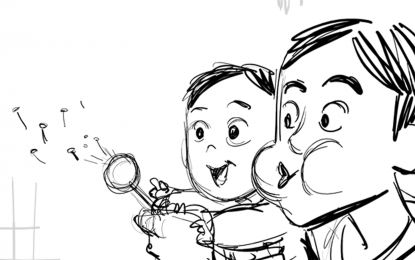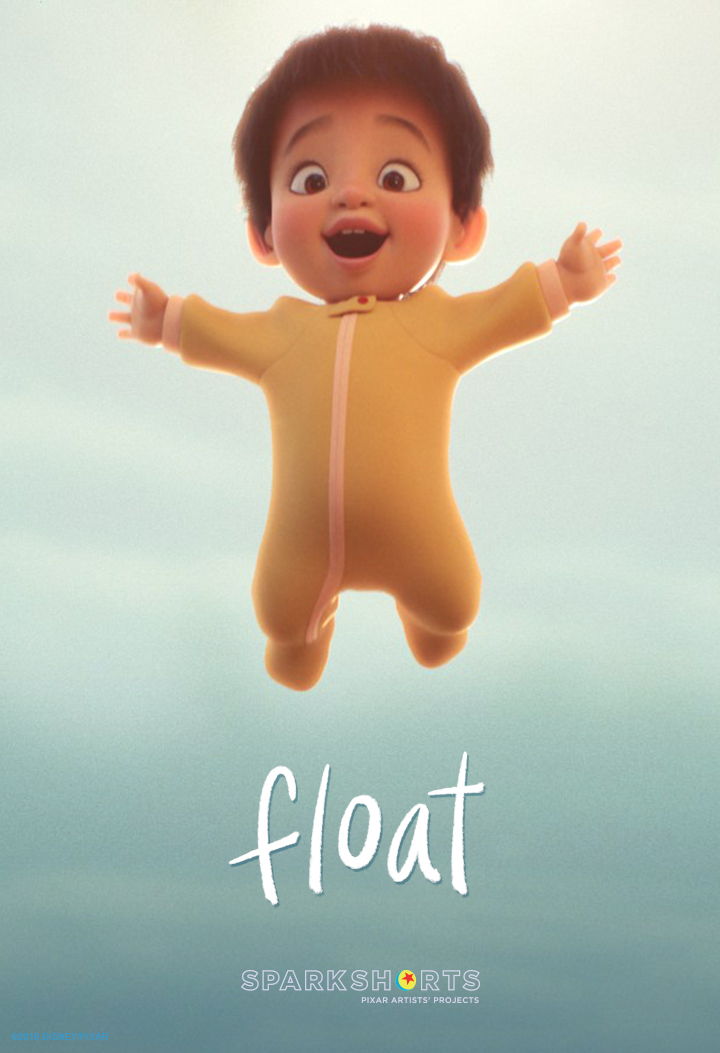
A FATHER'S JOURNEY. Filipino-American storyteller, Bobby Rubio, says he accepts and loves his child, and does not care about what others may think. He calls on parents to treat all children with the same dignity and respect. (Storyboard courtesy of Pixar)
MANILA – Finding out your child has a "difference" that would need special care could be very difficult. One father, after battling with depression, used his talents to tell the world his story.
Filipino-American story artist, Bobby Rubio, had his directorial debut for Pixar SparkShort's "Float". It shows a father whose child has the ability to float or levitate. At first, the father tried to hide his son from the public's eye, afraid of what they might think of his unusual ability. Eventually, the father didn't mind what others might say and let his son enjoy and play with his company.
As of Thursday, the short film already has more than 23 million views since it was uploaded on YouTube last Feb. 27. The movie debuted on Disney Plus in 2019.
It may be colorful and animated, the film was inspired by Rubio's story, as his son, Alex, was diagnosed with autism.
Filipino-American story artist, Bobby Rubio, had his directorial debut for Pixar SparkShort's "Float". It shows a father whose child has the ability to float or levitate. At first, the father tried to hide his son from the public's eye, afraid of what they might think of his unusual ability. Eventually, the father didn't mind what others might say and let his son enjoy and play with his company.
As of Thursday, the short film already has more than 23 million views since it was uploaded on YouTube last Feb. 27. The movie debuted on Disney Plus in 2019.
It may be colorful and animated, the film was inspired by Rubio's story, as his son, Alex, was diagnosed with autism.

FLOAT. This is the first Pixar short film that features Filipinos as lead characters, according to its writer-director, Bobby Rubio. The movie shows a father whose child could float. (Image courtesy of Pixar)
In an interview with the Philippine News Agency (PNA), Rubio shared that whenever he is with his son Alex, he encounters people who treat them in at least four different ways. There are those who are genuinely concerned about Alex and his well-being, those who are loving and supportive.
Some, however, are condescending and are hiding behind fake smiles, according to Rubio. "Oh, it must be so difficult raising a son who is autistic," he was told.
While some don't express an opinion and just leave them alone, Rubio said some treat Alex like he is not a human being. "They don't interact with him. Luckily, there isn't much of this type," he said.
Alex was two and a half years old when diagnosed with autism. "I didn't handle that news well, and I went into a depression," said Rubio. His wife encouraged him to tell his story, to get it out of him instead of holding it all in. So he drew a comic book. which he said was going to be called "Alex".
"On the cover, I drew a father standing in a field of dandelions, and his son floating in the air. The tag line was 'A father’s journey and a special child'," he said. The cover was all he was able to do back when he was still too depressed. Eight years later, seeing his son growing up, he revisited the "Alex" story and decided to make it into an animated short film.
The story gained the nod for SparkShorts, Pixar's short-filmmaking program dedicated to discovering new and diverse storytellers at the studio. It then became the first Pixar film to feature Filipinos as lead characters.
Rubio said he is like the father in the film. "I do share the father’s choice of accepting and loving his child and not caring what other people think. Because at the end of the day, those people are strangers, not immediate family or friends. So their opinions don't really affect me," he stressed.
Respect
"Treat all children with the same dignity and respect," Rubio urges parents with kids who do not have autism.
Go and interact with the family. Love them. Care for them.
He said that parents only want the best for their children, and thus, all parents hope their kids will be treated with love and respect.
"For families who have children on the autism spectrum, know that you are not alone in your journey. I went through some of the things you are going through," Rubio pointed out.
The storyteller said he hopes “Float” will help break the stigma attached to autism, and that it could help open up discussions that lead to a more welcoming and loving community.
Some, however, are condescending and are hiding behind fake smiles, according to Rubio. "Oh, it must be so difficult raising a son who is autistic," he was told.
While some don't express an opinion and just leave them alone, Rubio said some treat Alex like he is not a human being. "They don't interact with him. Luckily, there isn't much of this type," he said.
Alex was two and a half years old when diagnosed with autism. "I didn't handle that news well, and I went into a depression," said Rubio. His wife encouraged him to tell his story, to get it out of him instead of holding it all in. So he drew a comic book. which he said was going to be called "Alex".
"On the cover, I drew a father standing in a field of dandelions, and his son floating in the air. The tag line was 'A father’s journey and a special child'," he said. The cover was all he was able to do back when he was still too depressed. Eight years later, seeing his son growing up, he revisited the "Alex" story and decided to make it into an animated short film.
The story gained the nod for SparkShorts, Pixar's short-filmmaking program dedicated to discovering new and diverse storytellers at the studio. It then became the first Pixar film to feature Filipinos as lead characters.
Rubio said he is like the father in the film. "I do share the father’s choice of accepting and loving his child and not caring what other people think. Because at the end of the day, those people are strangers, not immediate family or friends. So their opinions don't really affect me," he stressed.
Respect
"Treat all children with the same dignity and respect," Rubio urges parents with kids who do not have autism.
Go and interact with the family. Love them. Care for them.
He said that parents only want the best for their children, and thus, all parents hope their kids will be treated with love and respect.
"For families who have children on the autism spectrum, know that you are not alone in your journey. I went through some of the things you are going through," Rubio pointed out.
The storyteller said he hopes “Float” will help break the stigma attached to autism, and that it could help open up discussions that lead to a more welcoming and loving community.

FLOAT. The short animated film was inspired by the writer-director's son, Alex, who was diagnosed with autism. The character shows the child is "different", as he is able to float or levitate. (Poster courtesy of Pixar)
"If you are in a rough spot right now, it’s fine to ask for help. I did, and my life is so much better because of it. Your mental health is just as important as your child. Once you are stronger, you can be a better parent to your child," Rubio noted.
Meanwhile, producer Krissy Cababa told the PNA she hopes "Float" is just the beginning of the world seeing many more Filipino and Filipino American stories on film.
"I try my best to work hard, to treat others fairly and with respect, and to amplify the voices of those who are not being heard," the Filipina American said.
Cababa shared that as a Pixar employee, she does not always get to choose the projects she would work on. Working with Rubio for "Float" was a great learning experience.
"I really admire all the hard work of everyone on the crew who contributed their talents to making the film, and I’m so proud of what we all accomplished together," Cababa said.
She would like to work on projects that feature women and girls and other underrepresented groups, and projects that, according to her, could help make the world a more tolerant, understanding, and empathetic one.
Pixar said Cababa is currently working as a production manager of an upcoming feature film. (PNA)
Meanwhile, producer Krissy Cababa told the PNA she hopes "Float" is just the beginning of the world seeing many more Filipino and Filipino American stories on film.
"I try my best to work hard, to treat others fairly and with respect, and to amplify the voices of those who are not being heard," the Filipina American said.
Cababa shared that as a Pixar employee, she does not always get to choose the projects she would work on. Working with Rubio for "Float" was a great learning experience.
"I really admire all the hard work of everyone on the crew who contributed their talents to making the film, and I’m so proud of what we all accomplished together," Cababa said.
She would like to work on projects that feature women and girls and other underrepresented groups, and projects that, according to her, could help make the world a more tolerant, understanding, and empathetic one.
Pixar said Cababa is currently working as a production manager of an upcoming feature film. (PNA)
